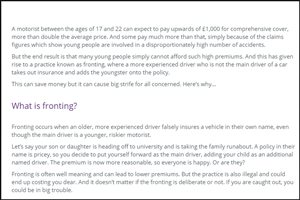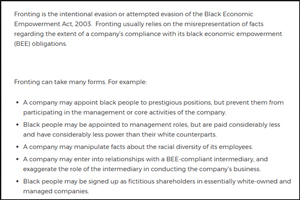Fronting Scams
Criminal activities on websites are becoming a serious concern for everyone and have become an unstoppable menace throughout the world. These scammers, who operate with criminal intent, disguise themselves as executives, sales managers, and officers to swindle the hard-earned money of the public. Though many individuals and corporate houses have escaped from their network, a few well-flourished organizations have lost millions of dollars to these types of criminals who operate from various developing countries. Insurance is gaining popularity throughout the world, and simultaneously, scams related to insurance are also increasingly becoming widespread. Scams related to fronting are keeping the authorities in a tizzy and bewildered.
Fronting scams are deceptive practices wherein an individual or entity falsely represents themselves as the owner or operator of a business, often with the intent of gaining advantages or benefits reserved for specific demographics. This fraudulent activity is especially prevalent in industries where government contracts, grants, or incentives are available to businesses owned by certain groups, such as minorities, women, or disadvantaged communities. The essence of a fronting scam lies in misrepresentation. The scammer portrays themselves as the legitimate owner when, in reality, they have minimal to no actual involvement in the day-to-day operations or decision-making of the business. The true ownership and control remain in the hands of an undisclosed party, often seeking to exploit affirmative action policies or incentives designed to support underrepresented business owners.
Fronting is nothing but fraud related to car insurance policies. The premium rates for the main driver are quite different from those for additional named drivers. It is imperative for the car owner to declare both the main and additional named drivers while taking out a policy. It is assumed that the main driver will do most of the driving until the policy expires, and the additional driver will drive only when the owner is unable to, due to exigencies. To put it simply, the owner of the car should be the one primarily driving it—not their children or other third parties. When the owner declares themselves as an additional driver and lists another experienced driver as the main driver, they end up paying a lower premium. In insurance parlance, this is termed as "fronting," since the owner provides misleading information to get a reduced premium rate.
Fronting scams also erode the integrity of programs aimed at fostering diversity and inclusion in business. These programs are crucial for leveling the playing field and promoting equal access to economic opportunities. When fronting scams occur, they undermine the trust and credibility of such initiatives, potentially leading to skepticism or calls for stricter oversight. To combat fronting scams, it is imperative for regulatory bodies, government agencies, and industry associations to implement rigorous verification processes. These processes should include thorough background checks, documentation reviews, and site visits to confirm the legitimacy of ownership and operational control. Additionally, educational campaigns and resources can help raise awareness about the dangers and consequences of engaging in fronting scams.
Insurance companies view fronting as a very serious fraud, as they have lost millions of dollars in fronting-related claims. However, the main problem is that proving negligence in claims related to fronting is difficult and challenging, since all members of the family may drive the vehicle after the owner takes out a policy. Insurance companies, however, view these types of claims from different angles and often catch the perpetrator red-handed through their time-tested methods. But in many situations, the insurance companies have been held liable, as they were unable to prove the proximate cause of the accident.
Insurance companies should be very serious and show extreme caution while issuing policies to customers. Some of the precautionary measures are listed below, which will be of great help:
-
Check whether the insured is migrating from another insurance company or is taking a policy for the first time. The insurer should exercise more caution while accepting proposals from individuals previously insured by other companies.
-
Scrutinize the applicant’s moral standing and social reputation thoroughly, and determine whether the proposer has made any claims with previous insurance companies.
-
In case of doubts, arrange for an investigator or surveyor to assess the credibility of the person proposing the insurance.
-
Never accept premium payments without receiving the proposal form, RC copy, and other necessary documents.
-
If you find that the person is a perpetrator, escalate the matter to the appropriate scam-reporting authority or to the police.
Insurance companies around the world are receiving thousands of claims related to these types of frauds. Scams related to business fronting are also hitting the headlines. Therefore, individuals should check scam lists related to fronting before proceeding further.










